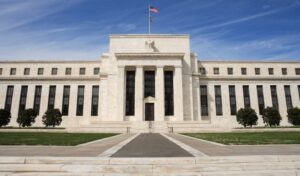
U.S. banking regulator seeks to stop banks from trading in metals like copper and aluminum.
In addition to typical banking activities such as issuing home loans and administering savings accounts, should your neighborhood bank be able to buy and trade metals like copper and gold? Presently, financial institutions can legally participate in commodities markets—which include trading in these precious metals—creating a state of affairs that some regulators and politicians say may increase commodities prices for consumers and create financial instability.
Following the 2008 financial crisis, elected and agency officials have debated the risks associated with banking institutions participating in commerce activities—a category that covers everything from buying other companies to investing in commodities such as oil or coal, or commodities facilities like storage warehouses or mines. The Office of the Comptroller of the Currency, which regulates and supervises national banks and federal savings associations, recently took steps to rein in bank participation in one type of commerce activity. The Comptroller published a new proposed rule that would prohibit banking institutions from buying or selling metals including copper, aluminum, and gold.
The Comptroller’s proposed rule would take effect by designating “investing and dealing in metals” as outside the scope of approved banking activity. Under federal banking law, a national bank may engage in activities that are part of, or incidental to, the business of banking. Activities that are part of the business of banking include issuing loans, taking deposits, and investing in stocks and other types of financial instruments. The Comptroller’s proposed rule declares that dealing in industrial metals is neither part of nor incidental to the business of banking.
Designating dealing in certain commercial metals as an out-of-bounds activity for commercial banks marks a reversal of position for the Currency Comptroller. It previously issued an interpretive letter stating that national banks could buy and sell copper—an industrial metal—because such trading was functionally equivalent to trading in precious metals like gold—an activity considered within the “business of banking.”
As indicated by the proposed rule, the Comptroller no longer believes that investing in copper markets is principally the same as dealing with coins made from precious metal or other types of gold. The Comptroller states that this reversal is consistent with the intention of the National Bank Act because copper is no longer traded in the same way as coins, and is valued differently. The Comptroller also notes that it has not seen evidence that trading in commercial metals benefits banks’ customers or business. For those reasons, the Comptroller proposes designating buying and selling copper outside the business of banking.
The proposed rule also forecloses arguments that dealing and investing in industrial or commercial metal is incidental to the business of banking. An activity is considered incidental if it is convenient or useful to an activity that is part of the business of banking. The Comptroller notes that because very few banks buy or sell industrial or commercial metals in the ordinary course of business, doing so every once in a while does not enhance their day-to-day business. It also declares that dealing in metals occasionally does not enhance banks’ ability to serve customers’ banking needs, nor does it help banks avoid economic loss or waste.
The proposed rule permits certain limited scenarios under which buying or selling industrial or commercial metal could be incidental to lending activities. For example, a bank could acquire and sell copper that was posted as collateral for a loan if that loan is not satisfied.
The Comptroller’s proposed rule comes on the heels of a report it co-authored with the Federal Reserve and Federal Deposit Insurance Corporation, which contains several recommendations to ensure the separation of traditional banking activities from more commercial activities. The report specifically states that the Comptroller would publish a proposed rule about limits on trading copper.
In the report, the Federal Reserve also recommends several other reforms that aim to “help ensure the separation of banking and commerce.” It proposes repealing a rule that allows bank holding companies to participate in commodities activities similar to those addressed by the Comptroller’s proposed rule for national banks and recommends strengthening standards for other commodity-related activities like trading derivatives. The report’s authors also recommend repealing authority for financial holding companies to participate in merchant banking activities like buying a stake of ownership in a company instead of providing a traditional loan.
The Comptroller’s proposed rule is part of a growing trend of regulatory and political pressure to separate traditional banking activity from commercial activity. Federal Reserve officials have expressed concern about the high risk associated with commercial activities as opposed to traditional lending and banking activities. In particular, regulators worry that financial institutions may manipulate the price of commodities, and that if financial institutions heavily invest in commodities, their exposure to environmental risks increases.
The comment period for the Comptroller’s proposed rule closed on November 14, 2016.



